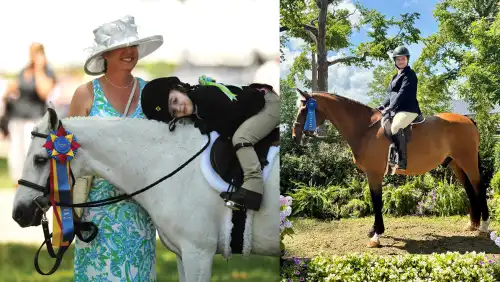Most of the crowd thronged to watch the $75,000 Budweiser AGA Championship today, in Wellington, Fla., didn’t recognize Jaime Guerra’s name. But, as Todd Minikus said, “It’s not his first day at the rodeo.” And Guerra made sure that by the end of the day, Dec. 4, everyone knew who he was by clinching the win in the final class of the National Horse Show.
Guerra, 41, has represented Mexico in two Olympic Games, and has been competing internationally for decades. Earlier this year, during the Winter Equestrian Festival in February and March, he made his debut in Wellington. Wins in the $40,000 Rocky Mountain Grand Prix (Colo.) and the $30,000 Oaks Classic (Calif.) qualified him for the AGA Championships, as he finished 21st in the year-end rider standings. For the last year, he’d been based in California, but decided to make a change, and moved his home base to Wellington two weeks ago.
Guerra’s win came as one of only three double-clear goes in a unique format. Of the 26 riders who attempted the tough first-round course that Jose “Pepe” Gamarra built, the top eight came back for a second round. Guerra, Ken Berkley on Carlos Boy, and Todd Minikus on Flier were the only three clean over the first round. But they were joined in the second round by the five fastest 4-faulters from round one. With the combined faults of the two rounds and the second-round time deciding the winner, there was no jump-off.
And the 4-faulters made it clear that they knew they had nothing to lose, zooming around the second round course quickly. Kent Farrington and Madison, who had already accepted their AGA Horse of the Year honors, zipped around to a fast clean round after having just one rail in the first trip. So, they had a four-fault total, and a time of 46.14. The three riders with clean rounds had to either take a high-stakes gamble and go fast, or play it safe and maintain a clean score.
Berkley, first of the clean rounds to go, played it safe, and cantered Carlos Boy to a careful clean round, stopping the timers in 53.01 seconds. Guerra, next in, looked a bit speedier, but still wasn’t even approaching a jump-off type pace. “I was thinking to go not too slow, and not too fast. The four-faulters really put the pressure on us. They had everything to win—we had everything to lose,” he said.
ADVERTISEMENT
Minikus, last to go on Flier, rode an efficient track, but anyone who’s watched him jump off before knew he wasn’t going his normal pace. “My horse has a very quick pace, so I just assumed that my normal speed would be fast enough. I didn’t want to go really fast and have a rail and end up in eighth behind a first-round four-faulter. You kind of had to pick your poison with this format,” he said. Minikus’ conservative trip stopped the timers in 54.50 seconds, and put him in third behind Guerra and Berkley.
After the class, the top three riders weren’t afraid to voice their opinion about the guaranteed-eight second round format. “This format does not apply to grand prix jumping, and it’s not what the crowd wants to see,” Minikus said. “All three of our horses jumped clear over a very difficult first-round course. And they could have lost to a horse that had faults in the first round. What do you do? Do you go fast, and if you have a rail down, explain to the owner why their horse ended up behind one that didn’t jump clean in Round 1?,” he said vehemently.
Guerra agreed. “I would have liked a normal jump-off. It was difficult enough to jump the first round clean. And with those three clean, it would have been a good jump-off for sure,” he said.
Regardless of the controversy over the format, Guerra’s win was the perfect way for him to say hello to the Wellington crowds. He’s planning on competing during the WEF in January, February, and March 2006. Then, he’ll travel home to Mexico for two weeks of their World Equestrian Games trials. From there, eight Mexican riders travel to compete at the Spruce Meadows (Alta.) summer shows for the final team selection. Guerra plans to show the horse he won today on, Santa Teresita Power Point, since he’s the only grand prix horse in his string now.
The AGA win was a good indicator for Guerra, since it was Power Point’s first real big class. He’d shown in smaller grand prix classes earlier in the year, but Guerra has taken his time bringing along the now-9-year-old gelding. He got him through a German connection as a 6-year-old. “I didn’t show him too much the first year. He needed to grow up. So he’s almost more like an 8-year-old now. But he has all the scope and he’s very good,” Guerra said.














